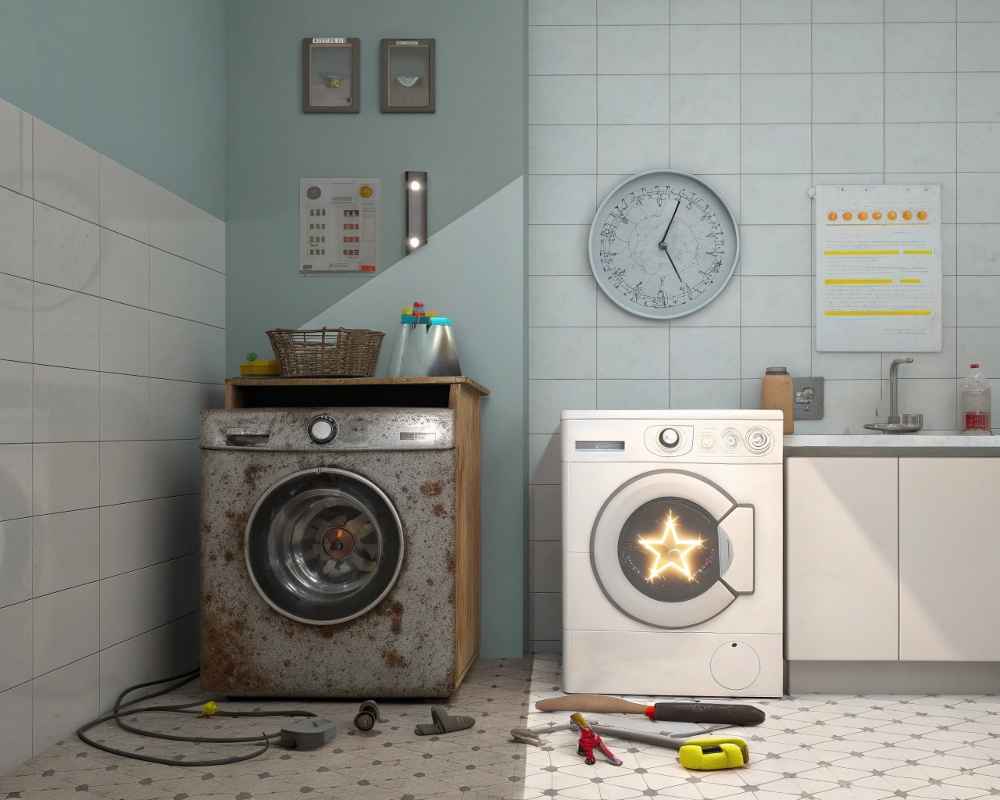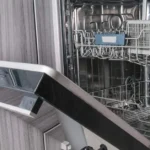When your appliance suddenly breaks down, it can feel overwhelming as you grapple with whether it’s time for your home appliances repair or replace. Many people find themselves in this dilemma, unsure how to proceed without breaking the bank or adding to the landfill problem. Did you know that opting for a replacement can strain your budget and significantly increase your carbon footprint?
The good news is that choosing to repair your appliance with Beach 2 Bay Appliances can be a more sustainable and cost-effective solution.
In this article, we’ll dive into why repairing is often the better choice and provide valuable insights to help you make a confident decision when faced with appliance troubles.
Factors to Consider: Appliance Repair or Replacement?
A malfunctioning appliance can present a real dilemma: Replace vs repair home appliances, which is the better option? Several factors come into play as you make this decision.
For instance, the appliance’s age often serves as a pivotal consideration. If it’s nearing the end of its expected lifespan, pouring money into repairs mightn’t be the wisest choice.
Moreover, take a moment to assess the cost of repairs. Are the expenses piling up? If frequent breakdowns are a recurring issue, it might indicate that the appliance is on its last legs.
Energy efficiency is another crucial aspect; older models tend to use more energy, which can lead to higher utility bills.
Additionally, consider the availability of replacement parts. In some cases, finding the necessary components can be a challenge, complicating your repair efforts.
Considering all these elements, you’ll be better equipped to make an informed decision about whether to repair or replace your appliance. If you’re leaning towards repairing near Niceville area then Niceville appliance repair service can provide the expertise you need to get the job done right.
Age of the Appliance
Understanding the age of your appliance is crucial when deciding whether to repair or replace it. Each type of appliance has an expected lifespan, such as refrigerators lasting 10-15 years and washing machines around 10-12 years.
If your appliance is approaching or has exceeded these age ranges, it’s likely facing age-related issues that could multiply soon. Knowing these timelines helps you evaluate whether a repair is a temporary or cost-effective fix.
Consider this lifespan benchmark before investing in repairs, as it may influence whether the appliance will continue to serve your needs effectively without frequent breakdowns. If you’re leaning towards repairing, Niceville appliance repair service can provide the expertise you need to get the job done right.
Cost of Repairs
Evaluating the cost of repairs is a crucial step when deciding whether to fix your appliance or invest in a new one.
Consider the cost vs benefits: if repair costs exceed 50% of the price of a new appliance, replacement might be more economical.
However, don’t overlook the repair lifespan. A detailed estimate from a technician can offer clarity.
It may be worth it if the repair significantly extends the appliance’s life at a reasonable cost.
Always weigh the immediate expense against the potential longevity benefits.
This mindful approach ensures you’re making a financially sound decision for your household.
Frequency of Breakdowns
After considering repair costs, assessing how often your appliance breaks down is essential.
If you’re facing frequent malfunctions, it might indicate that your appliance is nearing the end of its useful life. Frequent issues disrupt your daily routine and hint at underlying problems that may compromise appliance longevity. A professional Destin appliance repair service can help address these concerns and extend the lifespan of your appliance.
Evaluating whether these breakdowns are a sign to invest in a newer, more reliable model is crucial.
Energy Efficiency
While older appliances may have served you well, they often fall short in energy efficiency, leading to increased utility bills.
Upgrading or repairing these appliances is crucial for enhancing energy savings and improving appliance longevity. Newer appliance technology not only cuts down on energy use but also aligns with modern environmental standards, offering significant savings on electricity and water bills over time.
Consider the potential energy savings from a new or repaired appliance as an investment in your home’s efficiency. It’s innovative, cost-effective, and eco-friendly, ensuring you benefit from both reduced costs and increased appliance lifespan.
Availability of Replacement Parts
Shifting the focus to another key aspect, the availability of replacement parts can significantly impact your decision on whether to repair or replace an appliance.
When parts are scarce, sourcing options become limited, potentially driving up repair costs or even making repairs unfeasible. It’s crucial to check whether components for your model are still produced or stocked.
If you’re facing difficulties finding parts, this might push you toward replacing the appliance altogether. Conversely, if parts are readily available and reasonably priced, repairing could be the more economical and sensible option, extending your appliance’s lifespan without breaking the bank.
Impact on Daily Life
When considering whether to repair or replace your appliance, it’s important to think about how breakdowns affect your daily life.
Frequent malfunctions can disrupt your daily routine, forcing you to make adjustments that impact your family life. Whether it’s a broken refrigerator that complicates meal planning or a malfunctioning washer that piles up laundry, these issues can add stress and chaos to your household.
Deciding to repair can restore normalcy quicker and might be less disruptive than adapting to a new model.
It’s crucial to weigh these factors carefully to maintain your daily rhythm and family harmony.
Performance and Features
Assessing the performance and features of your current appliance is crucial before deciding whether to repair or replace it.
If it’s lagging in efficiency or lacking modern technology, consider the benefits of newer models that offer enhanced efficiency and are equipped with the latest advancements.
However, don’t overlook the potential of a simple repair to restore performance levels and incorporate some newer features.
Weighing the cost of updates against a full replacement can provide a clearer picture.
It’s all about balancing functionality with financial sense while aiming for the most sustainable option.

When to Repair
If your appliance is relatively new or only showing minor issues, opting for repairs can often be the wiser choice compared to immediately replacing it.
After all, high-quality appliances, especially those still under warranty, deserve a second chance.
Why not take a moment to evaluate the situation? By assessing factors such as the age of the appliance and the nature of the problem, you might discover that a simple repair could significantly extend its life.
Appliance is Relatively New
If your appliance is relatively new and experiencing issues, it’s often more sensible to consider repairs rather than replacement.
Most appliances have a substantial lifespan, and early problems might be anomalies.
Repair benefits include cost savings and extending the useful life of your appliance without the hassle of selecting and installing a new model.
Addressing these issues early can prevent more significant problems later, ensuring your appliance performs well for the remainder of its expected service life.
Don’t rush to replace; sometimes, a minor fix can make all the difference, maintaining both performance and efficiency.
Minor Issues
Properly handling minor issues in your appliances can often prevent the need for more significant, expensive repairs later on.
Common appliance issues like clogged filters or loose connections might seem minor but can escalate if ignored. You’ll find that many of these problems come with simple DIY troubleshooting tips that can save you time and money.
For instance, checking and cleaning the filters in your dishwasher or securing a loose wire in your toaster could be all that’s needed.
High-Quality Appliances
Investing in repairs for high-quality appliances can be a wise decision, especially if the unit is built by a reputable manufacturer known for durability.
When you’ve invested in premium, high-efficiency models, opting for repairs can maximize the longevity benefits these appliances are designed to offer.
Repairing can also be more cost-effective than replacing, particularly when dealing with minor issues that don’t compromise the overall functionality.
Warranty Coverage
Before deciding to repair or replace a malfunctioning appliance, it’s crucial to check your warranty coverage. Understanding the terms can significantly influence your decision.
Warranty considerations often include the appliance’s age and specific coverage limitations, such as whether parts and labor are included. If your appliance is still under warranty, repairs might cost you little to nothing.
Always review the warranty details to ensure you’re using it to its fullest advantage. This step can save you money and hassle.
Don’t overlook this – it’s your first move when you’re weighing whether to repair or replace.
When to Replace
It’s undeniably frustrating when an appliance breaks down repeatedly.
At some point, the costs associated with repairs can start to add up, and if they exceed half the price of purchasing a new model, it may signal that a replacement is in order.
Moreover, opting for a new appliance not only alleviates the headaches of constant malfunctions but also introduces the benefits of enhanced energy efficiency and modern features.
Imagine how much smoother your daily routine could become with updated technology at your fingertips.
Your Appliance is Breaking Down Often
When your appliance starts breaking down frequently, consider replacing it.
Frequent repairs disrupt your daily routine and signal deeper issues with appliance reliability. If you’re constantly calling for service, your appliance is likely nearing the end of its useful life.
While it’s tempting to keep fixing problems as they arise, this often leads to a cycle of unreliability and frustration. Assessing the frequency and nature of these breakdowns can help you decide whether it’s more practical to invest in a new, more reliable model that won’t let you down.
High Repair Costs
Continuing from the challenge of frequent breakdowns, another sign that it may be time to replace your appliance is when facing high repair costs.
If repairs exceed 50% of the cost of a new appliance, it’s worth considering a replacement. Although investing in a new model might seem steep initially, it can lead to significant long-term savings.
Evaluate how the ongoing costs of repairs stack up against the one-time expense of a new appliance. Remember, continually pouring money into an old unit can be more costly over time.
It’s about balancing immediate expenditures with future financial benefits.
Energy Inefficiency
As appliances age, they often become less energy-efficient, significantly impacting your household utility bills.
When considering the energy efficiency of your appliances, it’s essential to recognize that older models often consume more energy than newer, more efficient designs. This can lead to higher utility bills and a larger environmental footprint.
If your appliance is struggling to maintain optimal performance, it might be time to assess its energy usage. Repairing an appliance can sometimes restore its efficiency, but if it’s an older model, replacement might be a smarter long-term investment.
By opting for energy-efficient appliances, you not only reduce your monthly expenses but also contribute to a more sustainable household.
Always explore your options and consult with a professional to ensure you make the best choice for your home.
You Can’t Find the Right Replacement Parts
While considering the energy efficiency of your appliances, it’s also important to think about the availability of replacement parts.
If you’re struggling with finding compatible parts for your older model, consider replacing the unit. Understanding part availability is crucial, as the scarcity of specific components can turn a simple repair into a costly headache.
When parts become rare, repair costs may surge, and waiting times for these parts can disrupt your daily routine.
Weigh the practicality and cost of ongoing repairs against investing in a new, more reliable appliance.
You’d Like Better Features for Your Appliance
If you’re looking to enhance your home’s functionality and convenience, upgrading to a newer appliance model might be the right move.
New models often feature smart upgrades that can significantly boost your daily life’s efficiency. Imagine controlling your oven from your smartphone or having a refrigerator that can help manage your grocery list!
These aren’t just fancy features; they offer enhanced convenience that simplifies tasks, saves time, and can even reduce energy costs.
Making the Decision: Appliance Repair or Replacement
Finding yourself at a crossroads between appliance repair and replacement can be daunting. To navigate this decision effectively, start by assessing the overall condition of your appliance. Seeking a professional’s expertise can shed light on the severity of the issues at hand.
Once you have a clearer picture, the next step involves comparing the costs of repairs with the price of a new unit. As you weigh these options, it might be helpful to contemplate the long-term benefits of each choice.
For instance, a new appliance could offer energy efficiency and modern features that could save you money over time. Additionally, don’t overlook the potential for rebates or incentives that could ease the financial burden of a new purchase.
Ultimately, each situation is unique, and considering all these factors will empower you to make an informed decision that aligns with your needs and budget.
Evaluate the Overall Condition
Evaluating the overall condition of your appliance is a crucial step in deciding whether to repair or replace it.
Start by assessing damage and considering the appliance’s longevity. Look at age, performance history, and frequency of breakdowns. If it’s frequently malfunctioning or nearing the end of its expected lifespan, replacement might be more cost-effective.
However, if the issues are minor and the machine still performs well overall, repairs could extend its life significantly.
Consider also the efficiency and availability of parts. This careful evaluation helps you make a financially sound and environmentally conscious decision tailored to your specific situation.
Get a Professional Assessment
After examining your appliance’s overall condition, the next step is to seek a professional assessment to ensure you’re making the best choice between repair and replacement.
Contacting a trusted technician for a professional evaluation can provide crucial insights. They’ll conduct thorough appliance diagnostics to identify any underlying issues.
This process ensures that the decision you make isn’t only informed but also cost-effective in the long run. A professional can tell you whether the appliance has significant life left or if it’s time to invest in a new one. Trust their expertise to guide you right.
Compare Costs
Understanding the costs associated with both repairing and replacing your appliance is crucial as you weigh your options. Conducting a thorough cost analysis can illuminate the more economical path.
Typically, repairs are less expensive upfront compared to purchasing a new model, especially when considering installation and disposal fees. The repair benefits extend beyond immediate cost savings; they often involve quicker solutions and less disruption to your daily routine.
Comparing detailed repair estimates against the price of new appliances helps you make a grounded decision. Always consider both the financial aspect and the practical implications of each option.
Consider Long-Term Benefits
When deciding whether to repair or replace your appliance, consider the long-term benefits each option offers.
Repairing often leads to significant long-term savings by extending your appliance’s lifespan, avoiding the higher costs of buying and installing a new one.
Additionally, choosing to repair can have a positive environmental impact. It reduces waste and the need for new resources, helping to minimize your carbon footprint.
Check for Rebates and Incentives
Considering the long-term benefits of repairing your appliance can lead to significant savings and environmental advantages.
When deciding whether to repair or replace, it’s smart to explore options for rebates and incentives. Many utility companies and governmental bodies offer financial savings through assistance programs for those choosing energy-efficient repairs. This aid can substantially lower your costs.
Delve into your local offerings or consult your repair technician on possible benefits. Grasping these opportunities can significantly influence your decision, helping you opt wisely for your household and budget.
Always aim to maximize the potential financial savings available to you.
Common Appliance Problems and Repairs
The growing demand for repair services is evident, with the global home appliance repair service market projected to reach USD 20.5 billion by 2033, growing at a CAGR of 9.55%. Some appliance issues are more frequent than others; and they often influence whether a repair or replacement makes sense. From leaking refrigerators to dishwashers that won’t drain, understanding the most common problems can offer clarity when facing a decision.
We’ve highlighted these issues and the typical solutions they involve in our guide to Common Appliance Problems and Repairs. Visit that blog for a deeper look at the everyday malfunctions our technicians encounter and how they’re fixed.
Why Choose Beach 2 Bay Appliance for Smart, Budget-Friendly Appliance Repairs?

When deciding between repair or replacement, trust Beach 2 Bay Appliance to make the process simple and affordable. Our technicians don’t just fix appliances ; they help you make smarter decisions for your home and wallet. We offer honest assessments, fast service, and sustainable repair solutions that extend the life of your appliances. Before you replace, talk to Beach 2 Bay Appliance and discover how easy and cost-effective a professional repair can be.
Author Profile
- John Raymond Hagler
- Beach2Bay Appliances is a trusted name in Florida for professional appliance repair services. Serving homeowners, realtors, and property managers, our experienced team focuses on reducing costly breakdowns and maximizing appliance efficiency. Committed to reliability, transparency, and customer care, we help maintain the value and functionality of homes and rental properties through routine service and urgent repairs.
Latest entries
 BlogsAugust 30, 2025Oven Smells Like Burning While Cooking? Here’s the Solution
BlogsAugust 30, 2025Oven Smells Like Burning While Cooking? Here’s the Solution BlogsAugust 29, 2025Why Your Dishwasher Isn’t Cleaning Dishes and How to Fix It
BlogsAugust 29, 2025Why Your Dishwasher Isn’t Cleaning Dishes and How to Fix It BlogsAugust 29, 20257 Reasons Your Microwave Isn’t Working and How to Fix It Quick
BlogsAugust 29, 20257 Reasons Your Microwave Isn’t Working and How to Fix It Quick BlogsAugust 27, 2025Why Your Refrigerator Isn’t Cooling and How to Fix It
BlogsAugust 27, 2025Why Your Refrigerator Isn’t Cooling and How to Fix It